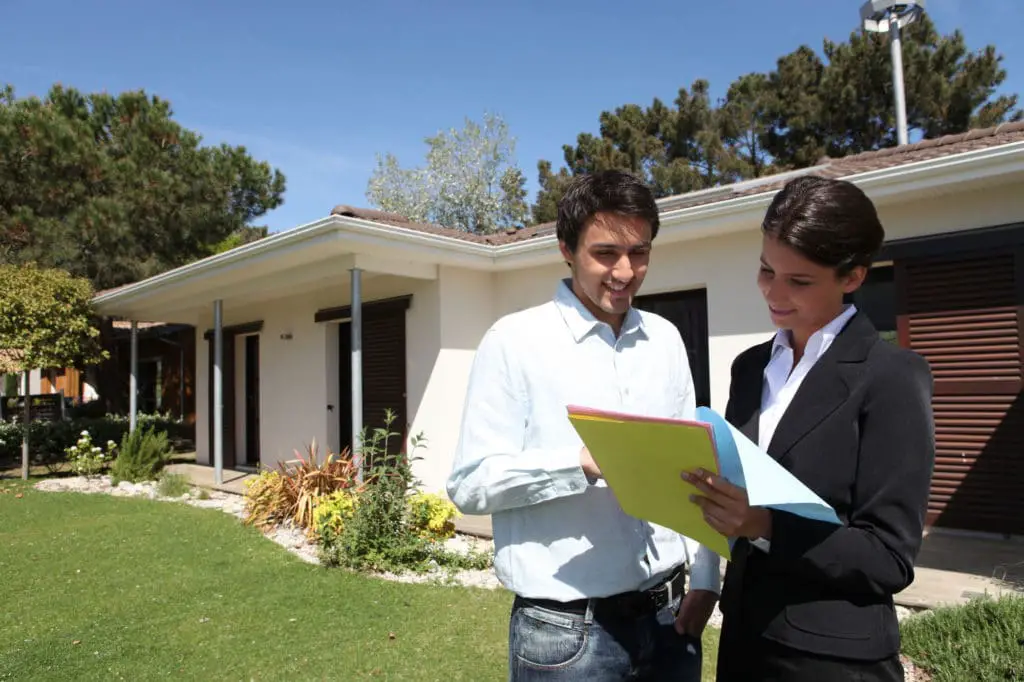(**) Disclosure: This post may contain affiliate links, meaning RealEstateCareerHQ.com will get a commission if you decide to make a purchase through the links, but at no additional cost to you.
To become a real estate appraiser in North Carolina, you need to fulfill the qualifying education, and work experience requirement. Also, you are required to register at the North Carolina Appraisal Board. This is the regulatory body which establishes the industry standard, regulates and issues the license for appraisers.
As a real estate appraiser in North Carolina, you could be appraising properties for a home buyer/seller, for a mortgage lender who wants to know the value of their loan portfolio, for tax assessment purposes or even negotiation of a lease.
Regardless of who is in needs of your appraisal services, your primary focus is to come up with an objective opinion about the market value of properties.
There are 4 license levels of appraisers in North Carolina:
- Registered Trainee Appraiser
- Licensed Residential Appraiser
- Certified Residential Appraiser
- Certified General Appraiser
The first step to your appraisal career is to complete the pre-licensing courses from a trusted education provider. McKissock received an incredible rating from its students, and their online lessons are taught by instructors who have actual experience in the appraisal industry. You may click here to find out more about their courses. (**)
How to Become a Trainee Appraiser in North Carolina?
Being a Trainee Appraiser is the first step toward your appraisal career. You will receive training and work under the supervision of a certified appraiser. Your job duties could include researching real estate, working on reports, or inspecting properties alongside with the mentor.
An experienced and thoughtful supervisor could guide you into the right direction in the appraisal career. The supervisory appraiser should teach you practical appraisal tactics, how to research on a property, how to extract meaningful information from the data. Most importantly, to come up with an objective and unbiased market value of the property.
The best way to learn is to walk through every step in the appraisal process, observe carefully on how your supervisor assess properties, and always raise your questions or concerns.
4 Steps to Become a Trainee Appraiser in North Carolina
Step 1: Meet the Basic Requirement:
- You must be at least 18 years old
- Have a valid Social Security Number
- No prior related experience is needed
Step 2: Complete the Pre-License Education
You need to complete 75 hours of qualifying appraisal-related education, AQB Supervisor/Trainee Course.
Here’s a table with the specific courses requirement.
Step 3: Submit Application to the North Carolina Appraisal Board
Now you have completed the education requirement, your next step is to begin the registration process.
If the Appraisal Board in your state has the online submission available, then I would strongly encourage you to use that option. Not only this is the quickest and most convenient way, but less paper mailing is also good for the environment. Here are more details.
Step 4: Find a Certified Appraiser to be Your Supervisor

At this phase of your appraisal career, you need to work under the supervision of a Certified Appraiser.
To make sure you can receive the proper training and the attention you need, a supervising appraiser cannot mentor more than three Trainee Appraisers concurrently. Your assignment could involve appraising commercial property, but only given your mentor is a Certified General Appraiser.
You should start to develop the habit of having an organized filing of your experience logs. These are essentials documents when it comes to upgrading your license in the future. For the Appraisal Board to recognize these documents, you and your supervisor must sign on every piece of them.
Here is the link to download the Appraiser Experience Log. This is a standard form in a spreadsheet format.
Some new entrants might concern that it could be difficult to locate a good supervisor. One way to start connecting with a network of appraisers ahead of time.
Not sure how to find a mentor? Don’t worry, here are 10 practical tips to find a supervisory appraiser.
How to Become a Licensed Residential Appraiser in North Carolina?

Some states do not have this license, but North Carolina is one of those who does.
As a Licensed Residential Appraiser, you are authorized to appraise for non-complex residential properties with 1-4 units, while the transaction value is to be less than $1,000,000. Although you can also evaluate complex properties, the value cannot be over $250,000.
You could working as a fee-based appraiser, providing services to clients such as individuals, lenders, banks, or appraisal management companies (AMC). Your daily tasks could include doing research online, going on the field to inspect properties, and writing the appraisal reports.
Alternatively, you could be recruited by an appraiser firm or financial institution to become their in-house appraiser, where you could enjoy the stable salary and company’s benefits.
This license could be a good alternative for those who have not fulfilled the necessary work experience or college-level education to become a certified appraiser but wish to advance their career from the Trainee Appraiser phase.
So what does a job for a Residential Appraiser look like? I found a job opening a while ago, which hopefully could give you some insights.
It was a job posting from an NYSE listed company in Chapell Hill. They were looking to hire a Residential Appraiser to work in their mortgage division.
Some of the job duties include:
- Appraising property value based on unbiased facts and data.
- Take photos and measurements while performing on-site inspections
- Review all factors that could affect property value including neighborhoods, trends, land, schools, parks, shopping centers, future changes in community.
- Present your finding to home buyers, sellers, creditors, investors, real estate agents
- Attend monthly in-house appraiser meeting
This job required candidates to either be licensed or certified. Prefer to have some experience in the mortgage or appraisal industry.
5 Steps to Become a Licensed Residential Appraiser in North Carolina
Step 1: Meet the Basic Requirement
- You must be at least 18 years old
- Have a valid Social Security Number
- Hold an Associate Degree
Step 2: Complete the Required Hours of Working Experience
You must have at least 1000 hours of acceptable appraisal experience, where they need to be acquired for over a 6 months period.
Step 3: Fulfill the Education Requirement
You’ll need to complete 150 hours of qualifying appraisal education from an approved course provider.
Since you should have completed some of the courses when becoming a Trainee Appraiser, you just need to complete the additional courses.
Step 4: Submit Application to the North Carolina Appraisal Board
Once you have fulfilled the education and working experience requirement, you should submit the application to the North Carolina Appraisal Board together with other required documents.
Step 5: Pass the Licensed Residential Appraiser Exam
Now it’s the time to write the exam! The purpose is to test your appraisal knowledge, especially the subjects that are covered in the pre-licensing courses.
Doing multiple sets of practice questions is an excellent way to prepare for the exam and also boost your confidence.
Here’s a Snippet of What Jamie Owen Thinks About Being a Real Estate Appraiser!

“The more you learn, the more you will enjoy being an appraiser.”
“I think that humility and honesty are the most important attributes. Humility is important because if we think we know it all, we are going to be in trouble. Being appraiser requires not being thin-skinned and defensive. Others have their opinions and we have ours. Both may be supportable in one way or another.
Being humble helps us to respect the views of others and not be offended if others have a different view. Humility also helps with business relationships, as well as accepting guidance and reminders when we need them, from peers and others.”
– Jamie Owen, Certified Residential Real Estate Appraiser at Aspen Appraisal Services
Here’s an exclusive interview with Jamie. He shared with us his journey and valuable experience in the appraisal industry. You’ll also learn what it is like to be a real estate appraiser nowadays.
How to Become a Certified Residential Appraiser in North Carolina?

As a Certified Residential Appraiser, you can assess for:
- residential properties with 1 to 4 residential units regardless of the transaction value or complexity.
- non-residential 1-4 units property given that the transaction value is no more than $250,000
Similar to a Licensed Residential Appraiser, you could a self-employed business owner running your own appraisal practice, servicing clients such as individuals, lenders, banks, or appraisal management companies (AMC).
Alternatively, you could work for an appraiser firm or financial institution to become their in-house appraiser, where you could enjoy the stable income and company’s benefits.
Unlike a Licensed Residential Appraiser, there is no limitation on the transaction value of residential properties you could evaluate. The scope of your practice and business opportunity would be a lot wider.
In fact, many reputable lenders and financial institutions in North Carolina only recruit or work with appraisers that have the certified credential.
The requirements to be a Licensed Residential Appraiser and Certified Residential Appraiser are mostly the same, except for the college-level requirements. Therefore, if you already hold a Bachelor’s degree, we do not see any reason to stop you from being certified.
5 Steps to Become a Certified Residential Appraiser in North Carolina?
Step 1: Meet the Basic Requirement
- You must be at least 18 years old
- Have a valid Social Security Number
- Bachelor’s Degree in any field of study; or higher
Step 2: Complete the Required Hours of Working Experience
You must have at least 1500 hours of acceptable appraisal experience where they need to be obtained for over a 12 months period.
Step 3: Fulfill the Education Requirement
You’ll need to complete 200 hours of qualifying appraisal education from an approved course provider.
Since you should have completed some of the courses when becoming a Trainee Appraiser or Licensed Residential Appraiser, you are only required to complete the extra classes.
Step 4: Submit Application to the North Carolina Appraisal Board
Once you have fulfilled the education and working experience requirement, you should submit the application to the Appraisal Board along with other required documents.
Step 5: Pass the Certified Residential Appraiser Exam
Most test centers would require you to bring at least two valid IDs to verify your identity. Don’t forget to bring them along. Else you won’t be able to write the exam.
How to Become a Certified General Appraiser in North Carolina?

Being a Certified General Appraiser is the highest credential you could get in the appraisal industry. You could assess all kinds of real properties regardless of the transaction value or complexity. There is no limitation on the scope of your appraisal work.
Although you still could evaluate for family-typed of clients, you could also be assess a portfolio of commercial real estates for institutional investors.
Since your clients depend on your appraisal reports in making an informed investment decision, you must be extremely careful and responsible when handling your work. Your primary goal is to perform detailed research and provide your clients with an objective appraised value.
Due to the high expectation of low margin of error in your work products, the amount of work experience and education required to become a Certified General Appraiser is the greatest among all the levels of licensing.
So having said that, what type of job is available for a Certified General Appraisal in reality?
There was a job posting from a bank in Wilmington, and we thought the details could give you some ideas.They were hiring a Real Estate Valuation Specialist, and the primary duty was to assist staffs in their lending department with real estate valuation.
The properties were used to secure commercial loans up to $3 million. The appraisal methods used must comply with the regulatory requirement, law and the Bank policy. For any loans over $3 million, the candidate would be responsible for ordering an external review of appraisals.
This position required a Bachelor’s degree, a minimum of 3 years experience in appraising commercial properties and must be a Certified Appraiser.
Although I couldn’t find out the income offered for this job, we can review how much do real estate appraisers earn in North Carolina. But for now, let’s focus on how you could become a Certified General Appraiser first.
5 Steps to Become a Certified General Appraiser in North Carolina
Step 1: Meet the Basic Requirement
- You must be at least 18 years old
- Have a valid Social Security Number
- Hold a Bachelor’s Degree in any field of study; or higher
Step 2: Complete the Required Hours of Working Experience
You must have at least 3000 hours of acceptable appraisal experience, where they are required to obtain in no less than 18 months. Of which a minimum of half the experience hours must be gained from working on non-residential properties.
Step 3: Fulfill the Education Requirement
You’ll need to complete 300 hours of qualifying appraisal education from an approved course provider.
Since you should have completed some of the courses from your previous license(s), you just need to make up for the extra courses.
Step 4: Submit Application to the North Carolina Appraisal Board
Once you have fulfilled the education and working experience requirement, you should submit the application to the Appraisal Board along with other required documents.
The Licensing Board in some states may require you to apply within a specific period after you complete the pre-licensing education. Therefore, don’t wait till it expires!
Step 5: Pass the Certified General Appraiser Exam
It’s now time to write the exam. Get enough sleep the night before the exam and have a good meal before it. Managing your stress level during the test is another key to passing it.
Is being a real estate appraiser a good career? – Let’s hear from an industry professional

“Currently, I am a Principal Commercial Appraiser with the Hennepin County Assessor’s office. My primary responsibilities are to value real property for tax petition purposes and provide expert witness testimony.
Prior to joining the public service sector, I was an independent fee appraiser who owned a residential appraisal firm and was a partner in a commercial appraisal firm. I have been a real estate appraiser for 26 years.
The appraisal industry has amazing opportunities in both the public and private sectors. The appraisal industry is especially well suited for entrepreneurs who wish to operate their own businesses.
Brett Hall, MAI, SRA, Principal Commercial Appraiser at Hennepin County
Is real estate appraiser a good career? This is one of the common questions I hear a lot. Therefore, I spent months and months in connecting with different real estate appraisers. Here are their valuable insights about this profession. Make sure to check it out!
What Appraisal Courses are Needed for Each License?
| Trainee Appraiser (Credit Hours) | Licensed Residential Appraiser (Credit Hours) | Certified Residential Appraiser (Credit Hours) | Certified General Appraiser (Credit Hours) |
|
|---|---|---|---|---|
| National USPAP Course or Equivalent | 15 | 15 | 15 | 15 |
| Basic Appraisal Principles | 30 | 30 | 30 | 30 |
| Basic Appraisal Procedures | 30 | 30 | 30 | 30 |
| Residential Market Analysis and Highest & Best Use | 15 | 15 | ||
| Residential Appraisal Site Valuation and Cost Approach | 15 | 15 | ||
| Residential Sales Comparison and Income Approaches | 30 | 30 | ||
| Residential Report Writing and Case Studies | 15 | 15 | ||
| Statistics, Modeling and Finance | 15 | 15 | ||
| Advanced Residential Applications and Case Studies | 15 | |||
| Appraisal Subject Matter Electives | 20 | 30 | ||
| General Appraiser Market Analysis and Highest & Best Use | 30 | |||
| General Appraiser Site Valuation and Cost Approach | 30 | |||
| General Appraiser Sales Comparison Approach | 30 | |||
| General Appraiser Report Writing and Case Studies | 30 | |||
| General Appraiser Income Approach | 60 | |||
| Total | 75 hours | 150 hours | 200 hours | 300 hours |
In addition to the above courses, you also need to complete the Trainee/Supervisor course before getting registered as a Trainee Appraiser.
Also, some of the courses are not allowed to be taken online. Make sure you confirm with the Appraisal Board or the education provider before enrolling into it.
Here’s how to register with the NC Appraisal Board

Once you have fulfilled the necessary requirement, you could submit your application to the North Carolina Appraisal Board. Here’s the link to download the application.
In additional to the form, you must provide the following:
- Registration fee: $200
- The payment could be made with a cheque or money order payable to “North Carolina Appraisal Board”
- Note the fee is non-refundable and non-transferable
- Supporting legal documents
- Evidence which shows you have completed the required hours of Board-approved appraisal courses. (i.e., Official transcripts, course completion certificates).
- Proof that you have fulfilled the specific requirement of post-secondary education for your license (i.e.: Diploma, official transcripts, certificates.)
- Appraiser Experience Log (Only if you are applying to become Licensed/Certified Appraiser)
- Criminal background check. More details can be found at CastleBranch.com. The package code is NG97.
Then mail the entire package to the North Carolina Appraisal Board. Their mailing address is on the first page of the application.
It typically would take 4 to 6 weeks to hear back from the Appraisal Board.
If you have any questions, you could also contact them at 9198704854 or ncab@ncab.org.
Schedule in Writing the NC Appraiser Exam
Upon acceptance, they will email you an approval notice with instruction to schedule the exam. Pearson-Vue will administer the exam.
- State Licensed Residential Appraiser Exam is a 4 hours exam,
- State Certified Residential Appraiser Exam is a 4 hours exam,
- State Certified General Appraiser Exam is a 6 hours exam
They all consist of 125 questions. Only 110 questions will be scored, the other 15 are pretest questions.
Remember to check out our 10 tips on how to pass the real estate appraiser exam!
FAQ on the North Carolina Real Estate Appraiser Career
How long does it take to become a real estate appraiser in North Carolina?
It takes 6 to 18 months to become a real estate appraiser in North Carolina. That is the minimum period to complete the work experience so the duration would hugely depend on which appraiser license you are pursuing, the time it takes you to complete the work experience, pre-licensing courses and pass the appraiser exam.
It takes 1,000 hours of work experience to become a Licensed Residential Appraiser in North Carolina, 1,500 hours to become a Certified Residential Appraiser and 3,000 hours to become a Certified General Appraiser.
How to renew a real estate appraiser license in North Carolina? What is the continuing education requirements?
All real estate appraisers in North Carolina need to renew their license each year by June 30th.
Below are the requirements to renew your appraiser license:
- Finish 28 hours continuing education every 24 months, of which must include 7 hours of National USPAP Update course.
- All these 28 hours of CE courses can be taken online, you you must complete them by May 31st of the renewal year.
- Since the National Uniform Standards of Professional Appraisal Practice (USPAP) is being updated every two years, you are required to finish the version between Oct 1st of an odd-number year and June 1st of an even numbered year.
The renewal fee is $200, but there is an additional $60 if you want to register in the National Registry. We do recommend you to include into the National Registry as this allows you to perform appraisals for federally-related transactions.
To avoid interruption to your appraisal practice, you should renew it and complete all continuing education requirement before the license expiry date.
Here’s a page on the Appraisal Board with more details about the license renewal.
How much does it cost to become a real estate appraiser in North Carolina?

It could cost cost approximately $1,360 to $4,400 to get an appraisal license. But this would depend on the level of appraisal license you are applying. Here’s the breakdown for your reference.
The fees for the registration and background are around $200, and the exam fee is roughly $130.
As for the appraisal courses, I checked with an education provider. Their online courses are priced around:
- $210 for a 15-hours course
- $280 for a 20-hours course
- $410 for a 30-hours course
- $780 for a 60-hours course
If you take courses individually, then the tuition would cost approximately:
- $1,030 for the Trainee Appraiser
- $2,070 for the Licensed Residential Appraiser
- $2,770 for the Certified Resident Appraiser
- $4,070 for the Certified General Appraiser
However, some of the courses are duplicated among different license levels. For example, you had already fulfilled part of the Licensed Residential Appraiser course requirement when you were becoming a Trainee. Therefore, you only need to pay an extra ($2070 – $1030)= $1,040 to complete the remaining classes.
Furthermore, I’ve seen an education provider offering appraisal courses in a bundle. With one discounted price, you could access to the course materials of all license levels for an entire year. This could be a massive saving if you eventually plan to become a Certified Appraiser.
Interested in becoming a real estate appraiser? Here is an Education Resources Page which could be helpful to you in getting the appraiser license.
Can you be a real estate appraiser with a felony in NC?
Yes, it is possible for a felon to become a real estate appraiser in North Carolina. The NC Appraisal Board will review the license application on a case-by-case basis. But the decision is subjected to their discretion.
They will consider the honesty, trustworthiness, character of the applicant. They will also review the severity of the conviction. When did it happen? Did you satisfy the sanction and learned from the wrongdoing?
3. If I have a character issue that requires Board review, how long will I have to wait before my application will be seen by the Board?
The Board usually meets six times a year. We try to get applications seen the next time the Board meets but this depends too upon when in the month we are able to compile background information on you.
Quote from the NC Appraisal Board website
But no need to get discouraged as everyone has a past. The most important is that you can demonstrate that you will serve the public in a fair, honest, and open manner from now on. Keep in mind that many people depend on your appraisal in making their decision. So your work must be unbiased and independent.
Here’s an article with more helpful ideas when applying for an appraisal license with a felony record. I’ll also cover the type of questions that will be asked and the kind of documents you should prepare.
How much do real estate appraisers make in North Carolina?

How much you can earn is subjected to many factors. To name a few, your licensing level, the type of properties you specialize in evaluating, your experience, the company size, its location, and most importantly, the amount of hard work you are willing to put into this career. Therefore, the earning ability among real estate appraisers in North Carolina could vary significantly.
According to the Bureau of Labor Statistic (May 2021), the average annual income of real estate appraisers in North Carolina is $49,750. The yearly income typically ranges between $40,410 and $75,700. Top earning property appraisers in North Carolina more than $92,660 per year.
Here’s a complete income guide on real estate appraisers in North Carolina. In there, I will uncover the income updates, the percentage of appraisers that are making a good living, and whether being a commercial or residential appraisers has any effect on the income. So be sure to check it out!
Is there a demand for real estate appraisers in North Carolina?
When I reviewed the figures (as of Nov 2019) displayed on the Appraisal Subcommittee website, there are a total of 2940 appraisers in North Carolina. The breakdown is as follow:
- # of Certified General Appraisers 1185
- # of Certified Residential Appraisers 1692
- # of Licensed Residential Appraisers 63
North Carolina has over 10.3 million people, and a relatively high population density. Among all the cities within, Charlotte, Raleigh, and Greensboro have the greatest number of residents. Whenever someone needs to get a valuation of a property (i.e., buying/selling, applying for a mortgage or refinance, divorce/estate settlement.), there would be demand for real estate appraisers.
Career tips for Aspiring Appraisers in North Carolina

Tip#1: Connect with other real estate appraisers
To gain a better insight into the appraisal industry, you should start connecting with other appraisers. You could do so through joining industry associations, forums or even LinkedIn groups. For example,
- North Carolina Real Estate Appraiser Association (NCREAA)
- NCRAA Facebook Group
- North Carolina Chapter of the Appraisal Institute
- NC Chapter Appraisal Institute LinkedIn Group
- AppraisersForum.com- North Carolina Forum
Start with a casual conversation. Let them know that you are planning to start your career as an appraiser, ask them what they like or dislike about the industry. Their insight and experience could be extremely helpful to your career building in the long run.
Tip#2: Start the pre-licensing education asap
You could read as much about the appraisal career as you want, but your journey would not begin unless you start taking action.
Taking the real estate appraiser classes would be your first step. Not only you could gain valuable knowledge and practical skills, but you will also have a better understanding about what is like to be an appraiser.
Besides, most states would require you to complete all the trainee education before your working experience could count toward the licensing requirement.
To assist you in the selection process, here’s a review of the appraisal courses provider that I like.
Tip#3: Work with reputable AMC(s)
If you are running a fee-based appraisal practice, then you’ll probably need to find your own clients. To do so, many appraisers might choose to take orders from Appraisal Management Companies (AMC).
Some appraisers were eager in finding businesses that they basically take on whichever orders that came along. Although this is totally understandable, there was an AMC who went bankrupt a few years ago. As a result, some appraisers only get paid partially for their work or nothing at all.
Even though this might not be a day-to-day scenario, some appraisers said they had a bad experience working with a few AMCs as they had the tendency of holding the fees without any legit reason. A well-managed company should have a clear rule of when the compensation will be paid out to the appraisers.
I suggest performing some due diligence about the AMC you will take order from. Consider checking out the customers’ rating, the company profile online and ask around other appraisers about it. You can find lists of AMC in different states here.
So that’s all I have to share for now, I hope you’ll find this post useful.
If you are reading up to this point, I bet you must be interested in the real estate appraiser profession. Your first step is to complete the pre-licensing courses. You should select one that has an excellent reputation and long-term track record of satisfying students. McKissock is exactly that! You may click here to check it out yourself. (**)
Disclaimer: The information in this post is for general information only, and not intend to provide any advice. They are subjected to change any notice, and not guaranteed to be error-free. For full and exact details, please contact the North Carolina Appraisal Board.
(**) Affiliate Disclosure: Please note that some of the links above are affiliate links, and at no additional cost to you. Our company, JCHQ Publishing will earn a commission if you decide to make a purchase after clicking on the link. Please understand that we include them based on our experience or the research on these companies or products, and we recommend them because they are helpful and useful, not because of the small commissions we make if you decide to buy something through the links. Please do not spend any money on these products unless you feel you need them or that they will help you achieve your goals.
Reference:
- The Appraisal Foundation- National Uniform Licensing and Certification Examinations: (Source)
- Bureau of Labor Statistics – Appraisers and Assessors of Real Estate (Source)
- Appraisal Subcommittee- Active Appraiser Credentials Summary Report (Source)
- salary.com- Salary for Appraiser (Commercial Real Estate) in North Carolina: (Source)
- salary.com- Salary for Appraiser (Residential Real Estate) in North Carolina: (Source)
- North Carolina Appraisal Board- (Source)
- North Carolina Appraisal Board Information Booklet- (Source)
- Pearson-Vue Appraiser Examination Candidate Handbook – (Source)

